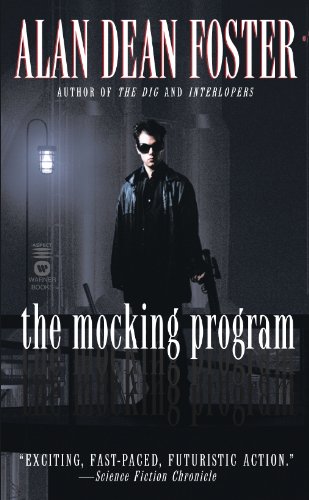You see this book?
I argue that the first two chapters of this book are the best first two chapters in all of science fiction. And yet I hate this book.
I read the book all the way through. Here's how it happened.
I was standing in my friendly, neighborhood library where I had returned a Stuart Woods book (always a good read, sometimes a great read), and I was looking for another fiction book to entertain myself with betwixt and between my research on the Mayan calendar. I wandered over to the science fiction section (I love scifi) and started pulling volumes based on the attractiveness of the dust jacket.
Nah, read that.
Hmm. Kim Stanley Robinson. Blue Mars. Flip, flip. Dull start. No.
Christ, don't they have any Cyril Kornbluth? How 'bout Harry Harrison? I could go for some Stainless Steel Rat right now. Or Laumer's Retief.
Wait. What's this? The Mocking Program. Any good?
So I sat myself down and read the first chapter.
Wow! Great writing! Seriously edgy. And a gripping story hook!
But a little voice in the back of my head whispered, "Remember that writer -- whatshisname -- who said he put ninety percent of his effort into the first chapter? What if this guy did the same?"
So I read the second chapter.
And . . .
Wow! Great writing! Seriously edgy. And the hook is set deeper!
I took the book to checkout and took it home. Read the rest.
As I recall, The Mocking Program has 28 chapters. I reached the mountaintop in Chapter 2. From there, it was a twenty-six chapter slide into the pit. I never felt so let down in my life.
What did I learn from this experience?
Curiously, I still judge books by the first two chapters. Silly me.
But I did learn that great writing -- Foster still wrote well in Chapter 28 -- cannot save a weak story.
Why was the story weak?
Well, what makes a story strong?
Stargate SG-1 episodes in seasons one and two were, more often than not, strong. Why?
Peter Williams.
Peter Williams played Apophis, Team SG-1's nemesis. He gave them a strong, powerful, handsome enemy. More, he gave viewers someone they loved to hate. And he was a human figure. Yeah, I know he was possessed by a Gou'ald, but the face we saw was human.
So what, then, makes a story weak?
The lack of a strong, powerful, handsome, HUMAN-FIGURED enemy.
In the end < spoiler alert > the enemy in The Mocking Program is a computer. That did not work for Colossus: The Forbin Project. Foster could not make it work here, either.
When Apophis died, we felt pity for the person whom the Goa'uld had inhabited. When the program winked out in The Mocking Program, I did not care. I was just glad it was over.
Now, there are many, many good things about the book. Foster fully realized his Mexamerica. Great world-building. It feels real. On the line level, great writing that has an edgy, gritty feel.
If you are a writer, it is worth some time to study this book. What works? What does not work? Why?
It ain't a good model, but it can be a bad example
YMMV.
Buy the book: The Mocking Program $9.99 at Amazon
____________________



No comments:
Post a Comment